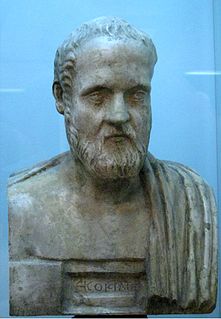A Quote by Aristotle
In a polity, each citizen is to possess his own arms, which are not supplied or owned by the state.
Related Quotes
If the state cannot be entirely composed of good men, and yet each citizen is expected to do his own business well, and must therefore have virtue, still inasmuch as all the citizens cannot be alike, the virtue of the citizen and of the good man cannot coincide. All must have the virtue of the good citizen - thus, and thus only, can the state be perfect; but they will not have the virtue of a good man, unless we assume that in the good state all the citizens must be good.
I ask of each Mason, of each member, of each brother, that he shall remember ever that there is upon him a peculiar obligation to show himself in every respect a good citizen; for after all, the way he can best do his duty by the ancient order to which he belongs is by reflecting credit upon that order by way in which he performs his duty as a citizen of the United States.
Those who directed the state in the time of Solon and Cleisthenes did not establish a polity which ... trained the citizens in such fashion that they looked upon insolence as democracy, lawlessness as liberty, impudence of speech as equality, and licence to do what they pleased as happiness, but rather a polity which detested and punished such men and by so doing made all the citizens better and wiser.
For the power given to Congress by the Constitution does not extend to the internal regulation of the commerce of a State (that is to say, of the commerce between citizen and citizen,) which remain exclusively with its own legislature; but to its external commerce only, that is to say, its commerce with another State, or with foreign nations, or with the Indian tribes.
By calling attention to 'a well regulated militia,' 'the security of the nation,' and the right of each citizen 'to keep and bear arms,' our founding fathers recognized the essentially civilian nature of our economy... The Second Amendment still remains an important declaration of our basic civilian-military relationships in which every citizen must be ready to participate in the defense of his country. For that reason I believe the Second Amendment will always be important.
Some years ago, someone had come up with the idea that the State should hold all Titles to vehicles, mailing a Certificate of Title to the 'owners'. This created a legal fiction that the State owned the vehicles. Drivers were thus driving a State owned vehicle, mandating drivers must have a license to drive a State vehicle, which was false. The State reaped many millions with its drivers license scam, and began issuing heavy fines for not having a State license.
Does the open wound in another's breast soften the pain of the gaping wound in our own? Or does the blood which is welling from another man's side staunch that which is pouring from our own? Does the general anguish of our fellow creatures lessen our own private and particular anguish? No, no, each suffers on his own account, each struggles with his own grief, each sheds his own tears.
With only one life to live we can't afford to live it only for itself. Somehow we must each for himself, find the way in which we can make our individual lives fit into the pattern of all the lives which surround it. We must establish our own relationships to the whole. And each must do it in his own way, using his own talents, relying on his own integrity and strength, climbing his own road to his own summit.
A perfect historian must possess an imagination sufficiently powerful to make his narrative affecting and picturesque; yet he must control it so absolutely as to content himself with the materials which he finds, and to refrain from supplying deficiencies by additions of his own. He must be a profound and ingenious reasoner; yet he must possess sufficient self-command to abstain from casting his facts in the mould of his hypothesis.






































